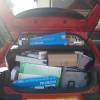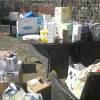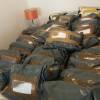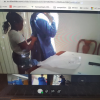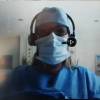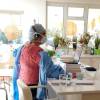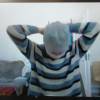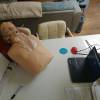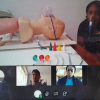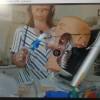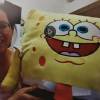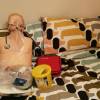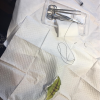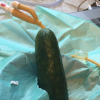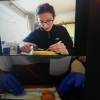Teaching practical and clinical skills remotely
UCL Clinical Skills team posted resource kits to students to enable synchronous practical procedure teaching during a pandemic.
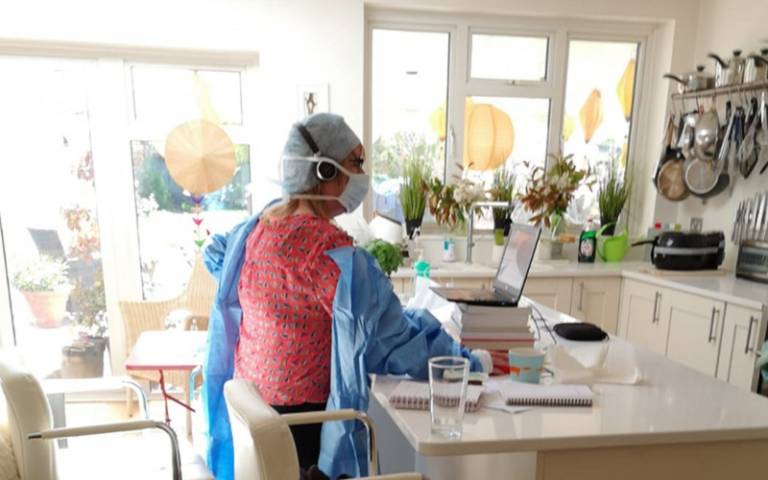
19 May 2020
Deirdre Wallace, Principal Teaching Fellow and Principal Clinical Skills Tutor and Manager at UCL Medical School, describes how her team managed to continue teaching hands-on clinical procedures remotely, with the help of Blackboard Collaborate, bananas...and Spongebob Squarepants!
The Clinical Skills Team within the Medical School are a group of A&E and / or ICU nurses with a strong interest in clinical education. The team is usually based across the Royal Free, Whittington and Bloomsbury campuses and is made up of:
- Deirdre Wallace
- Catherine Phillips
- Tina Nyazika
- Khalil Rawat
- Emma Thompsett
- Emma Kelley
- Jan Halsey
Jumping into action
On 13 March 2020, UCL announced that face-to-face teaching would be cancelled for the remainder of the academic year due to the Covid-19 outbreak. There were approximately 130 fourth year medical students who still needed Practical and Clinical Skills teaching to complete the curriculum requirements for the year. WWe were mindful that 50% of the cohort had already learned and had been assessed on these skills so bringing the remaining students up to standard was important. Some were also planning to volunteer under clinical supervision during the pandemic, so we worked at speed to upskill them further to enable them to support experienced staff in the response.
With only days to prepare, the Clinical Skills Team drove onto campus and removed key consumables and teaching manikins from the skills centres. Each tutor returned home with both manikins and medical supplies that equipped them to teach the procedures ‘live’ via Blackboard Collaborate. We also brought enough consumables home to allow us to prepare a teaching and learning package for each student. This was mailed to each student’s home address. They were also given details of fruit and vegetables to purchase as a replacement for manikins.
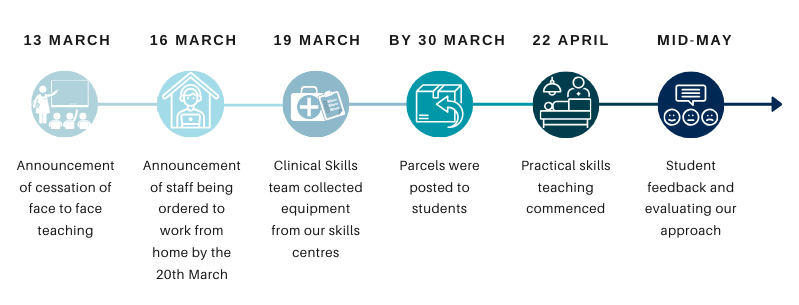
Posting teaching packs
Three senior tutors took the extra supplies home and were responsible for assembling and posting teaching packs to the students. Retrieving the equipment was an all-day affair and three of the staff gave approximately a day and a half each to creating the packs for 130 students.
The students were emailed and if they wished to take part were asked to provide their lockdown postal address. Unfortunately, only UK students received teaching packs. Those student who were overseas were emailed an equipment list just in case there was any chance they could obtain supplies locally.
Essential equipment for active learning
Students were divided into groups of ten for Critical Care and 21 for practical procedures. Each session had one clinical tutor. Before each session a preparatory email was sent; we pointed to our YouTube channel, PowerPoint presentations and instructions to prepare a substitute manikin.
Sessions taught were: scrubbing, gloving and gowning; bladder catheterisation; suturing; subcuticular and intramuscular injection; intravenous drug administration; basic airway management; nasogastric tube insertion; basic life support and advanced life support; and care of the critically ill patient algorithm. Students used cucumbers for bladder catheterisation, oranges for injections and bananas for suturing. They were instructed to insert an intravenous cannula into a kitchen sponge as preparation for the intravenous drug administration session.
Teaching practical procedures to medical students is not only an important part of their learning, it is a form of learning that needs a hands on approach. Actually performing the cognitive and motor skills when learning a practical procedure such as suturing and performing CPR is essential. Although we have teaching videos and lots of other learning materials on line via moodle nothing can replace the active learning process of performing the skill, handling and assembling the equipment and trying to adopt a sterile technique throughout the procedure. Providing them with equipment was an essential part of the lesson planning process.
This approach is definitely a first for UCL and as far as I know, it is a first for any medical school. Some medical schools have delivered synchronous lessons online where they demonstrated skills or showed videos, but none that we are aware of have provided their students with resources that enabled them to participate in the session and get feedback on their performance.
Student reaction
The team are always exceptional, but the outcome of our endeavours since the 17 March 2020 has been have been outstanding. Their families have been involved helping to collect supplies, organise resources and participate in some teaching sessions.
We embraced the technology to ensure we were technically and pedagogically prepared for the change to synchronous virtual teaching. Technology was challenging at times for both the students and the tutors. Demand on Wifi networks was significant and often audio or visual issues occurred. Fortunately, all sessions were recorded, permitting students to review the material and procedure at a later date.
The students’ response has been wonderful. Their gratitude for our efforts began from the moment I sent the first email asking for their postal addresses.
Anecdotally, the sessions had a positive effect on their feeling of belongingness and identity. Comments included; “it helps me feel like I am still a medical student and part of the medical school”.
Others stated that this was the highlight of their week. All students enjoyed being taught in smaller groups and remarked that they enjoyed interacting with each other and with the tutor.
The tutors faced their own challenges, for example, becoming fluent with the digital platform and attempting to maximise the pedagogical experience for the students while avoiding technical errors. It was also difficult to find a suitable virtual classroom to teach from within their homes that would allow visibility of the manikins and the full procedure. However, the effort was hugely appreciated and after the final session on 14 May, the students posted on Unitu and Twitter about their gratitude and the value of the sessions.
“"...The Clinical Skills teaching team have gone above and beyond this term. We've been sent a mountain of equipment to practise with at home (can't imagine the headache of organising this) and received a full course-load of teaching..."
'The show can go on' with connected learning
'Remote, not distant' is a great phrase. The connection we make with our students over the six years of their time with us in medical school is very special. Maintaining that is important to them and to their teachers. Synchronous sessions can be a means to create and maintain that community.
Our practical procedures sessions involved groups of 20 students that were further reduced to groups of 4 when they were placed into groups on collaborate. Within the smaller groups, the students were able to turn on their mics and cameras, connect with each other, ask questions and the teachers could help them perfect their technique.
“It was great fun and gave us a project to focus our attention on our students and each other during this time of uncertainty. It highlighted the resilience of our students and staff. The show can go on. - Deirdre Wallace, Clinical Skills team, UCL Medical School
Future plans
There is no doubt that medical practical procedures training needs to be hands on. For patient safety this should happen in a simulated environment initially and then in a clinical environment under supervision. However, should we remain remote until the end of 2020 and and even beyond, we intend to repeat this project, with the inclusion of 5th and 6th year students. For round two, we will have time to revise the contents of the packages, include our overseas students and use UCL’s postal team to take care of the packages.
 Close
Close


